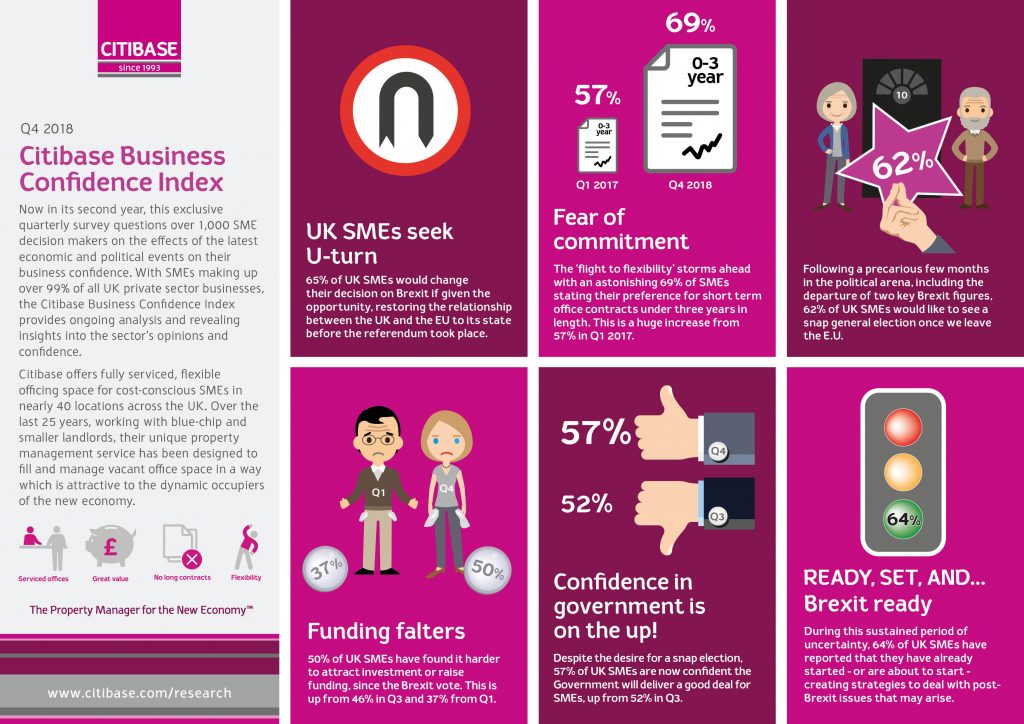 Back to all news
Back to all news

UK SMEs seek U-turn following Brexit chaos – but confidence in Government is growing

• 62% of SME decision makers would like to see a snap general election after Brexit happens in March 2019 • 67% of UK SMEs would like to remain part of the customs union • 50% have found it harder to attract investment or raise funding since the referendum, up from 46% in Q3 • […]
• 62% of SME decision makers would like to see a snap general election after Brexit happens in March 2019
• 67% of UK SMEs would like to remain part of the customs union
• 50% have found it harder to attract investment or raise funding since the referendum, up from 46% in Q3
• Despite this, confidence is growing with 57% of SMEs confident in Government to negotiate a good deal for SMEs, up from 52% in Q3 and just 33% last year
• 65% of UK SMEs would change their decision on Brexit if given the opportunity
• However, 64% have already started, or are about to start, creating a post-Brexit strategy to deal with any issues that may arise
As Theresa May’s Brexit deal faces the commons this week, 65% of UK SMEs would change their decision on Brexit given the opportunity (up from 61% in Q1), according to the latest Citibase Business Confidence Index, now in its second year. Similarly 62% would like to see a snap general election after we leave the E.U.
Interestingly confidence in the Government to deliver a good deal for SMEs has actually increased, with 57% of SMEs now confident up, from 52% in Q3 and just 33% at the end of 2017. 57% of UK SMEs are also confident that the Government will finalise negotiations by the March 2019 deadline, up from 54% in Q2.
The exclusive quarterly survey of 1,048 SME decision makers by flexible office champion Citibase, reveals that during this sustained period of uncertainty, many UK SMEs are taking the initiative, with 64% reporting that they have already started – or are about to start – creating strategies to deal with post-Brexit issues that may arise. Interestingly, 62% of UK SMEs state that they would like to remain part of the customs union.
Part of this preparation during uncertain times includes de-risking when it comes to office contracts, with 69% preferring office contract lengths of less than three years, up from 57% at the start of 2017. Additionally, when considering an office, SMEs rated flexible, short-term contracts (48%) and the ability to easily change the size of your space (56%) as some of the top priorities, both increasing in popularity by over 10% each from last quarter.
While often grabbing headlines, lifestyle facilities such as gyms and wellness areas ranked poorly (21%) in terms of importance, suggesting that SMEs crave flexibility as they approach the March 2019 deadline and want to get on with running their businesses without costly extras.
Financially, 71% of UK SMEs have seen revenues rise or stay the same since the referendum and 69% state that they expect revenues will rise or stay the same once Brexit has happened and the UK has left the EU, suggesting confidence amongst the small business community. However, 50% have found it harder to attract investment or raise finding, up from 46% in Q3. Those in London (71%) and the Scotland (58%) have found it most difficult.
Despite being at the heart of a ‘civil war’ among his own party, Boris Johnson was first choice for Prime Minister in Q3 at 23%, followed by Theresa May (21%) and Jeremy Corbyn (17%). ‘BoJo’ lost ten points this quarter, falling to third place with Theresa May being the number one choice for Prime Minister with 16% of the votes, followed closely by Jeremy Corbyn (13%). Interestingly, Jacob Rees-Mogg, a total outsider in Q3, doubled his popularity to 10%.
Steve Jude, Citibase CEO, comments: “While confidence levels amongst the SME community are up, there is still a palpable sense of uncertainty in the area resulting in many wanting to do a U-turn on Brexit. However, it is reassuring to see many SMEs already making post-Brexit business strategies as they look to de-risk. SMEs are cautious about the future and don’t want to commit to anything that may stifle their success, such as long-term office contracts that don’t allow them the flexibility they crave to be agile, successful businesses
“Smart building owners and landlords can also thrive during these uncertain times, turning to flexible office providers like Citibase who can transform their underused spaces, whether a single floor or an entire building, into profit-generating assets packed with a vibrant community of SMEs.”
The exclusive quarterly Citibase Business Confidence Index, now in its second year, reflects the views of 1,048 small businesses across a wide variety of sectors including marketing, PR, financial services, travel and recruitment.
Key headlines and regional splits
• 62% of SME decision makers would like to see a snap general election after Brexit happens in March 2019, with Theresa May as the preferred candidate for Prime Minister. In the North East, Jeremy Corbyn is the favourite (20%), as well as in Yorkshire (24%), while in the South East it is Theresa May (24%). Boris Johnson is the preferred choice in the East Anglia at 22%
• Confidence is growing – 57% are confident in Government to negotiate a good deal for SMEs, up from 52% in Q3. London SMEs are the most confident at 74% while SMEs in the South West are the least confident at 26%
• 57% think the Government will meet the March 2019 deadline, up from 54% in Q3. Confidence is the highest in the North East at 74% and SMEs in the South West have the least amount of confidence at 28%
• 69% of UK SMEs desired short term office contracts of three years or under, up 10% from this time last year
• 65% of SMEs would like to reverse the Brexit process and stay in the EU – up from 61% in Q3. SMEs in the North East have the greatest desire to reverse the Brexit process at 80%
• 50% of SMEs have found it harder to raise funding or attract investment since the referendum – up from 46% in Q3. Those in London (71%) and in Scotland (59%) are most likely to have found it more difficult
• 67% of UK SMEs would like to remain part of the customs union. Percentages to remain in the customs union were highest amongst London SMEs (74%) and Scottish SMEs (73%)
• Business leaders in all regions are most likely to think their own region will be hardest hit by a no-deal result. E.g. 68% in London think it will be London, 64% in Scotland think it will be Scotland, 51% in the North East think the North East
Our latest news and blogs
Need help finding your new office?
Get in touch:










